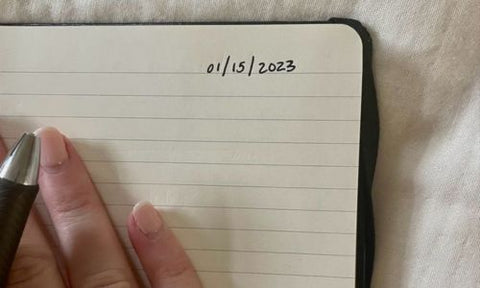
Do you struggle letting go of the past? Are you missing someone who isn't coming back, living in regret or constantly reliving past experiences?
Shadow work prompts for letting go are a powerful journaling tool to get to the root cause of your problems and lead to healing and transformation. Let's get into how they work and what you should do to practice;
What is Your Shadow Self?
Your shadow self is all the parts of you that you keep hidden due to trauma, suffering, conditioning, guilt and shame. It's the place in the subconscious mind where we store all of our greatest fears and deepest desires.
What we don't realise is that all of this repression starts to build up and seeps into all of our conscious thoughts and actions.
The more you repress these feelings, the darker your shadow becomes and the harder it is to work through your problems. Struggling with issues of letting go can often lead to depression and predominantly negative thoughts.
This is a sign that there is repressed trauma that is asking for your attention.
What is Shadow Work?
Shadow work is the practice of bringing awareness to your shadow self. Carl Jung, the renowned psychologist who coined the term stated that; one does not become enlightened by imagining figures of light, but by making the darkness conscious. In order to truly let go, you first have to question the assumptions that you have about yourself and your past.
You need to face your trauma head on and ask yourself some tough questions. This practice will help you to access the parts of the subconscious mind that are storing this trauma. Why are you holding on so tightly to the past? Who is the person that you're holding onto? Why do you replay these memories over and over again? What is it about your present circumstance that makes you reminisce so much?
Interestingly, much of the way you cling to the past can be linked to your childhood programming and conditioning. Delving into the repressed memories of your childhood is a powerful way to figure out where this behaviour comes from.
I am not what happened to me, I am what I choose to become - Carl Jung.
Shadow Work & Childhood Programming
The shadow self is deeply connected to your childhood formative years. Between the ages of 0-7 years old both hemispheres of your brain are firing as you absorb all of the conditioning from your parents, siblings, schooling and society like a sponge.
During this time you begin to develop your personal belief systems and assumptions about the world. By the time you're 8 years old these belief systems are deeply ingrained into the subconscious mind and will impact your decision-making as an adult without you even realising.
For example, Andrea grew up with a dad who held grudges, was very proud and argumentative. By observing her dad's behaviour Andrea grew up with the belief that proving your point, being right and resenting anyone who wronged you was normal behaviour.
As an adult Andrea struggles with confrontation, forgiveness and letting go. She finds it difficult to maintain healthy relationships, has lost a lot of friends and is stubborn. Andrea thinks that this is just her personality.
When in reality this behaviour goes back to her childhood conditioning. Practicing shadow work prompts would help Andrea to unpack her deep rooted trauma and acknowledge the part of her shadow self that is sabotaging her relationships. Once she recognises where this behaviour comes from, she will be better equipped to heal and understand her emotions.
How to Practice Shadow Work Prompts
Choose a time in your day where you can be alone and in a calm environment. Remember that this can be quite an intense and emotional practice, so it's best to make your space as comfortable as possible. This will help you to focus on all of the feelings that arise as you answer your prompts.
Take out a pen and paper and write down the number of the prompts that resonate with you. If you read one that makes you feel uncomfortable then you're onto something great. Don't hold back with your writing, don't censor yourself or worry about what anyone will think. This is just for you.
Take some time to sit and answer these questions, be as detailed and specific as you can be. The more you do this practice the more you will understand why you're struggling to let go. Answering these shadow work prompts will help to unearth the subconscious thoughts that are secretly sabotaging you and can ultimately lead to transformation.
35 Shadow Work Prompts for Letting Go
- Visualise yourself as a child around 8 years old, what would you tell yourself? Are you scared, excited or worried for your younger self? Why?
- Visualise yourself as a teenager. What was something that made you excited about life? What made you feel happy? When's the last time you felt like that?
- Do you blame yourself when things go wrong? Are you too harsh on yourself? How do you forgive yourself?
- When was the last time someone broke your trust? How did you react?
- Think of someone that you miss. Why do you miss them? Did this person make you better or worse? If they made you better, how can you accept that they're no longer a part of your life? If they made you worse, how can you let go and accept that you are better off?
- What was your earliest childhood memory of people fighting? How did they resolve their issues? How did this affect you?
- When you first meet someone, how do you think they perceive you? Why do you assume that they think this? How would you like to be perceived?
- What triggers you to overthink? What's something that consistently pops up in your mind? Why do you keep replaying this moment?
- What is a situation that you have overcome and you're proud of?
- What's your first memory of betrayal? Who betrayed you? Who apologised first, if at all?
- When you make mistakes, how do you move on? Do you punish yourself? Do you acknowledge that you made a mistake?
- When was the last time you felt truly happy? Where were you? Who were you with? What can you do to get back to that feeling?
- Do you blame yourself for ruining your last relationship? Is this a fair reason? If it is, can you forgive yourself?
- When was the last time you held a grudge? What did the person do? Why did you feel as though you had to hold on for so long? Who apologised first?
- When was the last time you apologised to someone? Why did you apologise?
- Do you feel shame or regret about some of your actions? Does it still torment you? What are you gaining by feeling this regret?
- Of all of your relationships which do you identify as the worst? Why? What did they do to hurt you so badly? What did you learn from this experience?
- Does thinking about the past benefit you in any way? Why do you keep replaying the same story? What haven't you confronted about this situation?
- Do you find it easier to forgive yourself more than others for doing the same thing?
- What are 3 things about yourself that you've always loved? Why do you admire these things about yourself?
- What is an event in your life that you lose sleep over? How long have you been thinking about this? Can you recognise that thinking about this over and over is bad for you? How do you move on?
- What or who is your biggest burden? Why are you still holding on? If you can't let go, how can you improve this situation?
- What's 5 things that you can change right now to help you move forward with your life (this doesn't need to be goal oriented, just small changes that will make you happy)
- When is the last time you regretted saying something? What did you say? Why did you say it? Could you have approached this in a different way or was it less of a big deal as you thought?
- How do you accept apologies? Are you gracious about it or do you gloat? Why do you respond like this?
- Who is a couple that you admire and aspire to be like? What qualities do you see in their relationship?
- What's an example of a friendship you admire and wish to have? What qualities do you see in their relationship?
- Think of the 5 closest people in your life right now. Does each of these relationships serve you anymore? Why, why not?
- How do your 5 closest people treat you? Who are you in this group? What is your role?
- What makes you feel safe?
- Do you worry about what people think of you? Why does what anyone else thinks matter to you? How does it affect you?
- What is a toxic emotion that you have? What's something that you react to in a way that even you recognise is wrong? What happens when you act this way?
- Do you resent anyone right now? Is there someone who makes you feel angry when they cross your mind? Why are you letting this person have so much power over you?
- What relationship have you let go of in the past that you hold no regrets toward. How did you let that go? Have you forgiven that person?
- Do you avoid tough conversations? Would you rather leave something be than try to resolve it as quickly as possible? Why do you prolong this feeling?
Final Thoughts
Letting go is hard for everyone. For some though, it's a constant state of overthinking, negative thoughts and depression. Journaling with shadow work prompts will help you to confront why letting go of the past is so difficult for you. Through this awareness you will have the opportunity to acknowledge your issues, let go and move on.
If you have any questions or practiced these shadow work prompts and found them helpful, feel free to contact us with your story. We'd love to hear how these prompts have helped you to let go.



